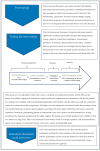"Preparation Is Key": Parents' and Nurses' Perceptions of Combined Parent-Delivered Pain Management in Neonatal Care
- PMID: 39062231
- PMCID: PMC11274501
- DOI: 10.3390/children11070781
"Preparation Is Key": Parents' and Nurses' Perceptions of Combined Parent-Delivered Pain Management in Neonatal Care
Abstract
Background: There is a knowledge-to-practice gap regarding parent-delivered pain management, and few studies have investigated parents' and nurses' participation in and acceptance of combined parent-delivered pain-alleviating interventions such as skin-to-skin contact (SSC), breastfeeding, and parental musical presence. This study investigated parents' and nurses' perceptions of and reflections on experiencing combined parent-delivered pain management.
Methods: This qualitative study applies a collaborative participatory action research design using ethnographic data collection methods such as focus groups, video observations, and video-stimulated recall interviews with parents and nurses.
Results: The results concern three main categories, i.e., preparation, participation, and closeness, as well as various sub-categories. Preparations were central to enabling combined parent-delivered pain management. Participation was facilitated by parental musical presence, in which parents shifted their attention toward their infant. Closeness and presence during neonatal care helped parents become active during their infant's painful procedures. Parental lullaby singing created a calm and trusting atmosphere and after the procedure, both parents and nurses felt that they had successfully supported the infant through a potentially painful procedure.
Conclusions: Mental and practical preparation is central to implementing combined parent-delivered pain management. When parents and nurses explored the interventions, they found the methods feasible, promoting self-efficacy and confidence in both parents and nurses.
Keywords: infant; neonate; pain management; parent; parent-delivered intervention.
Conflict of interest statement
The authors declare no conflicts of interest. The funders had no role in the design of the study; in the collection, analyses, or interpretation of the data; in the writing of the manuscript; or in the decision to publish the results.
Figures
References
Grants and funding
LinkOut - more resources
Full Text Sources
Miscellaneous



